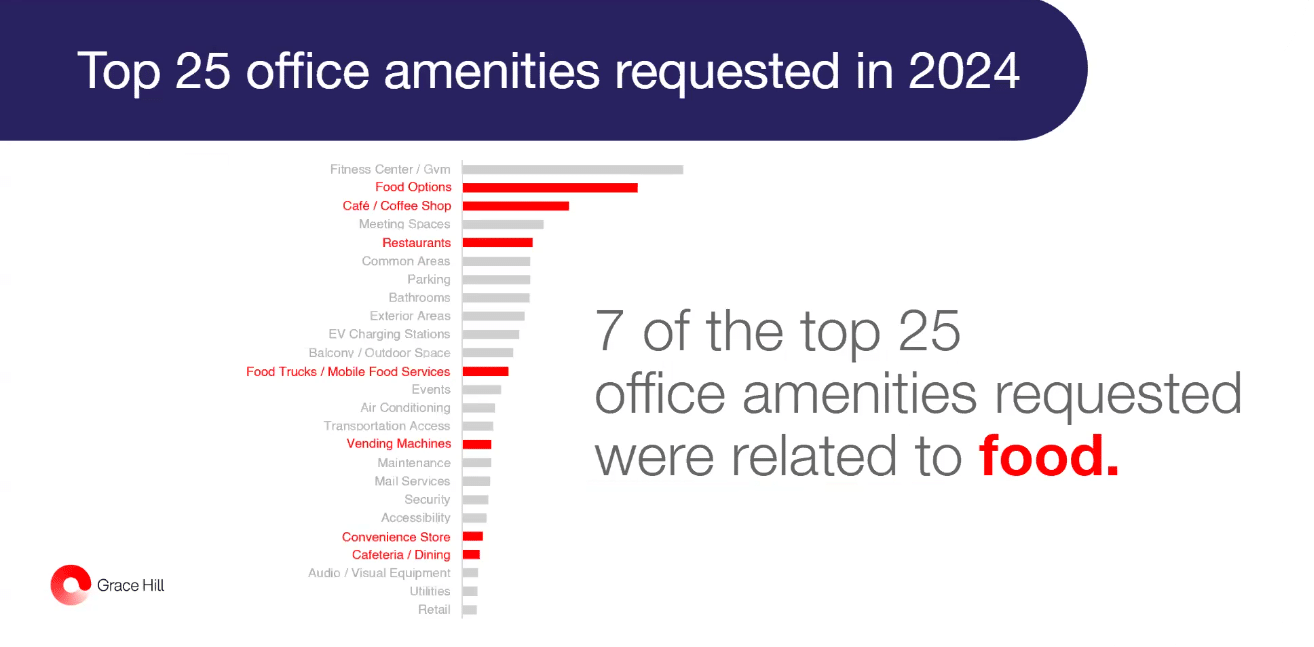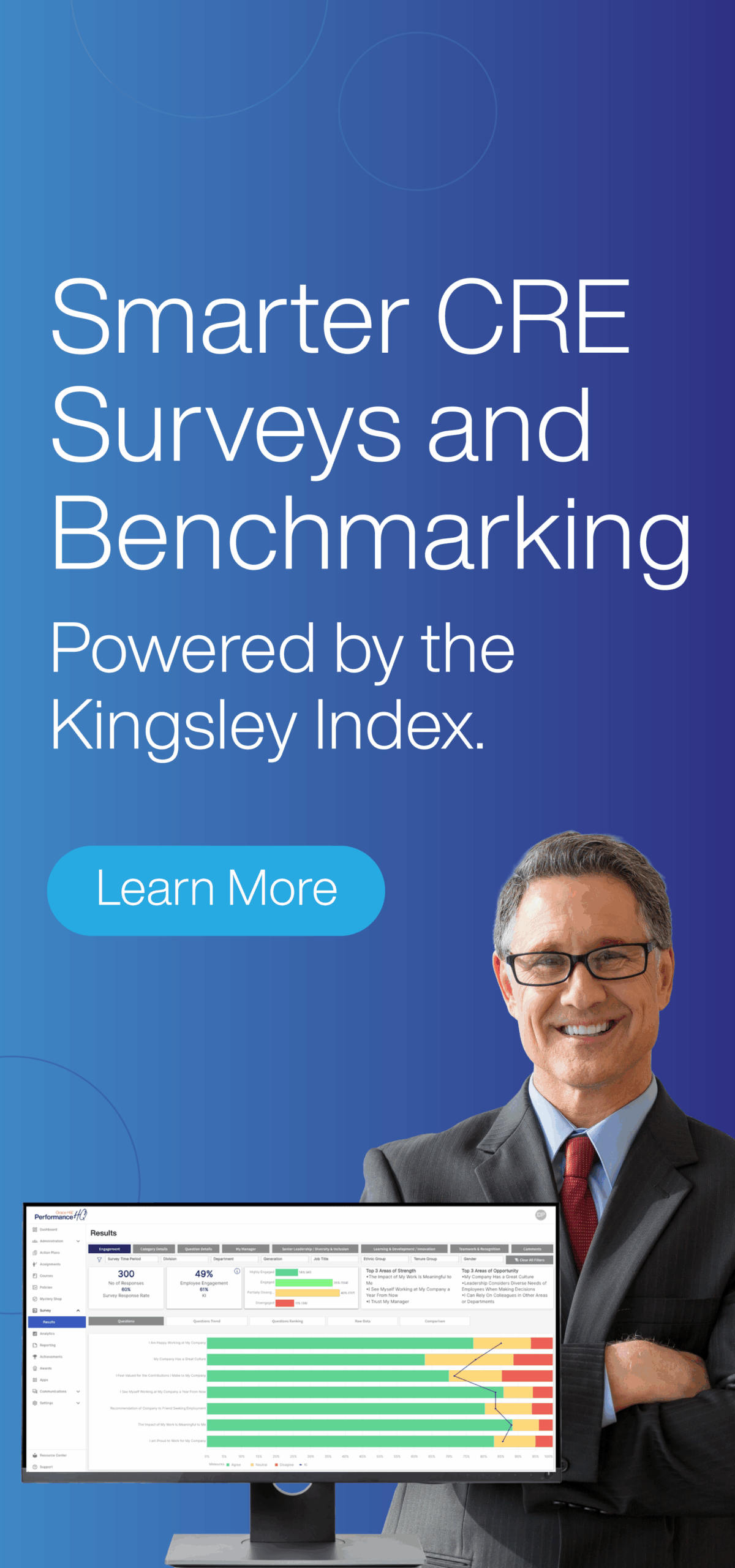Tenant experience and tenant satisfaction are paramount to a thriving commercial real estate (CRE) experience.
Today’s tenants expect more than just four walls and a lease; they seek workplaces that enhance productivity, foster community, and support well-being. From seamless digital interactions to eco-conscious amenities and flexible workspaces, tenant expectations are shifting rapidly. Property managers who fail to recognize these evolving priorities risk losing tenants to more forward-thinking competitors. How can CRE landlords and property managers meet these demands and create an environment where tenants thrive and businesses succeed?
By prioritizing tenant experience and satisfaction, CRE professionals can boost retention, increase property value, and create a dynamic environment where businesses flourish.
Jump to a Section
- What is tenant experience?
- What do tenants expect? (7 Drivers of Tenant Satisfaction)
- Why does tenant satisfaction matter?
- How do you know what your tenants really want?
- Keep Your Finger on the Pulse of Tenant Satisfaction with Grace Hill
What is tenant experience?
Commercial property managers must understand that a strong tenant experience is more than just providing a functional workspace — it’s about creating an environment that enhances daily life.
Tenants value convenience, accessibility, and a sense of belonging, so cultivating a space that fosters collaboration and engagement is essential.
Beyond the physical space, tenant experience is also shaped by the overall atmosphere and culture of the building. A well-curated experience ensures tenants feel heard and valued. This includes:
- Responsive management.
- Seamless communication.
- Proactive problem-solving.
Whether through social events, sustainability initiatives, or cutting-edge workplace solutions, the tenant experience directly impacts employee satisfaction, productivity, and long-term lease renewals.
Consider the following statistics about the importance of the CRE tenant experience shared by Building Engines:
- 92% of CRE landlords recognize that tenants want more from their buildings.
- 88% of CRE landlords say they believe data on tenant preferences is important to their overall business strategies.
- 90% of CRE landlords are planning to provide dedicated tenant experience staff or already do.
Given the data, it’s clear that most commercial property managers recognize and understand the pressing need to prioritize the tenant experience. But what exactly do tenants expect from their workspace?
What do tenants expect?
As a result of the pandemic, JLL research reports that employees began shifting their priorities in terms of quality of life, human interaction, and personal values.
Tenants now seek workplaces that prioritize flexibility, well-being, and seamless digital integration. The shift toward hybrid work models has pnly heightened expectations for adaptable spaces, smart technology, and enhanced health and safety measures. Property managers and tenants want environments that support productivity while also fostering a sense of community, offering amenities such as wellness programs, sustainability initiatives, and networking opportunities.
According to Partners Real Estate, the following key strategies have become critical drivers in delivering a premium tenant experience that drives satisfaction. They include:
1. Flexibility and Customization
Recent CBRE research highlights the growing demand for adaptable workspaces since “80% of current office occupiers have adopted and will sustain hybrid work policies.” Additional 2024 data from KingsleySurveys suggests that while 30% of tenants plan a full office return, 47% require employees to be in-office on a structured but limited basis.
Offering modular office designs and shared amenities ensures that businesses of all sizes can create an environment that supports their workforce while optimizing space utilization.
2. Tenant Amenities
A JLL study predicted increasing demand for buildings equipped with tenant amenities, underscoring their growing importance in tenant retention strategies. KingsleySurveys data reveals that food-related amenities make up 7 of the top 25 most in-demand office features, including cafes, more dining choices, mobile food services, and vending machines. Tenants also showed strong interest in fitness centers, common areas, EV charging stations, and balconies.
➝ View Now: Strategies for Increasing Your Commercial KingsleySurveys Score in 2025
Whether offering on-demand services onsite or nearby, integrating features that give tenants back their time significantly enhances satisfaction and boosts the property’s overall value and appeal.

3. Sustainability
Sustainability is no longer just a trend — it’s an expectation. Today’s tenants want to work in buildings that align with their values, particularly when it comes to environmental responsibility.
A 2023 CBRE survey revealed that “79% of respondents cite green building certifications as having an impact on real estate decisions. Almost half of respondents would pay a premium for green-certified buildings.”
Commercial property managers can meet this demand by implementing sustainable practices, such as recycling programs and green transportation options like bike racks and electric vehicle charging stations, and integrating energy-saving initiatives and sustainable design elements into their buildings.
This might include:
Energy Saving
- Energy-efficient HVAC systems
- LED lighting
- Water conservation initiatives
- Renewable energy sources
Sustainable Design
- Rooftop gardens
- Green walls
- WELL-certified workspaces
In fact, key findings from a study conducted by Harvard’s T.H. Chan School of Public Health show that employees in green-certified spaces have “26.4% cognitive function scores” and “30% fewer health issues.”
By prioritizing sustainability, CRE professionals can not only reduce operational costs but also enhance tenant retention and overall workplace well-being.
4. Technology Integration
Today’s tenants expect a seamless technology integration experience. From mobile apps that streamline building access and service requests to AI-driven analytics that anticipate tenant needs, smart solutions allow property owners and managers to deliver more personalized and proactive services. This includes equipping properties with high-speed internet, state-of-the-art security systems, and building automation technologies that allow for personalized control over lighting, climate, and access.
From Internet of Things (IoT) devices providing real-time data for predictive maintenance and improved tenant services to the rapid adoption of artificial intelligence (AI), technology is central to transforming tenant experiences.
As noted in the article “Top CRE Trends To Watch in 2025”:
“With 61% of firms already utilizing technology solutions and the PropTech market expected to grow at a CAGR [Compound Annual Growth Rate] of 15.8% from 2022 to 2030, innovation is reshaping the industry. A staggering 81% of industry leaders are expected to prioritize data and technology investments in 2025, signaling a shift toward innovation-driven growth.”
By embracing these technological advancements, property owners and managers can create a more responsive and engaging environment, leading to higher tenant satisfaction and retention rates.
5. Maintenance and Cleanliness
A well-maintained building is one of the most visible indicators of a premium tenant experience. Clean, orderly common areas, restrooms, and building exteriors not only enhance aesthetics but also contribute to tenant well-being and satisfaction.
Regular inspections, timely repairs, and proactive upkeep demonstrate professionalism and care, fostering a positive impression among occupants. However, with ongoing labor challenges, it can be difficult for property owners/operators to maintain the skilled maintenance teams necessary for keeping buildings well-maintained and clean.
Underskilled maintenance technicians can harm your portfolio, leading to higher repair costs, increased reliance on external vendors, and costly tenant turnover. SkillCat delivers essential maintenance skill growth to improve tenant satisfaction and reduce unnecessary repair costs. ➝ Learn More About SkillCat
Nevertheless, proper maintenance is more than just aesthetics; it’s essential for operational efficiency and health standards. More importantly, these efforts signal to tenants that their comfort and safety are top priorities, boosting retention and overall satisfaction.
6. Tenant Engagement
Creating a thriving tenant community goes beyond simply providing office space — it involves fostering an environment where collaboration, networking, and social interaction can flourish. Regularly hosting networking events, wellness programs, and professional development workshops can help strengthen tenant relationships and create a more engaging workplace.
Insights from Cushman & Wakefield revealed that “As the evolution of work shifts towards a blend of office, home, and alternate spaces, the role of the office has transformed too. Rather than serving as the one place where we once completed all our tasks, employees have highlighted the importance of the office as a hub for fostering community and connection. According to employees, the main purposes of the office include facilitating collaboration, nurturing relationships, and promoting social interactions.”
Providing shared workspaces, lounges, or wellness areas encourages organic interactions and reinforces a sense of belonging. By actively nurturing tenant engagement, property owners create vibrant, connected communities that make buildings more than just places to work.
7. Communication and Responsiveness
Ensuring that tenants remain informed and engaged is at the core of tenant satisfaction. Tenants expect clear, consistent, and timely updates regarding building operations, maintenance schedules, and policy changes.
Responsiveness is equally critical. Promptly addressing tenant concerns builds trust and demonstrates a commitment to service excellence. Property managers should establish streamlined processes for handling tenant requests. By actively sourcing tenant feedback and implementing necessary improvements, property owners/managers can create a more responsive and tenant-centric environment.
Why does tenant satisfaction matter?
Tenant satisfaction is a key driver of long-term property success. A positive experience leads to higher renewal rates, stronger financial performance, and a steady pipeline of prospective tenants. Satisfied tenants are more likely to stay, reducing turnover costs and vacancy periods while contributing to a thriving, stable property environment.
The connection between tenant satisfaction and lease renewals is well-documented. According to KingsleySurveys, 75% to 80% of tenants who indicate they are “likely to renew” actually follow through — a strong indicator that satisfaction directly impacts retention. However, high retention rates don’t just minimize leasing expenses; they also help maintain and increase asset value while supporting rent growth.
The bottom line? Unhappy tenants leave. Acquiring a new tenant is significantly more costly than retaining an existing one, requiring added marketing efforts, leasing incentives, and lost rent during vacancy periods. Investing in tenant satisfaction — through responsive property management, amenities, and proactive communication — directly translates to better financial outcomes and long-term property success.
➝ Access Ebook: Top CRE Trends for 2025
How do you know what your tenants really want?
Understanding tenant needs is essential for maintaining high satisfaction and retention rates. The most effective way to gain these insights is through third-party surveys, which offer an objective, data-driven view without the bias that can come with internal feedback collection.
For over 30 years, KingsleySurveys has been a trusted partner to the world’s leading commercial real estate (CRE) organizations. These surveys provide critical insights into tenants’ evolving needs, renewal intent, and likelihood of recommending a property, helping property managers make informed, strategic decisions. Regardless of portfolio size, these insights offer valuable benchmarks to guide improvements.
Grace Hill’s Commercial Survey Solution offers employee surveys, comprehensive policy management, benchmarking, and analytics. At its core is the KingsleyIndex™ — the industry’s most comprehensive benchmarking database, enabling property owners and managers to compare performance against industry standards and track progress over time.
Survey programs don’t just enhance communication and engagement — they create experiences that attract and retain high-quality tenants in an increasingly competitive market.
Keep Your Finger on the Pulse of Tenant Satisfaction with Grace Hill
Success in commercial real estate today hinges on a data-driven approach paired with comprehensive workplace solutions. By actively monitoring tenant feedback and leveraging cutting-edge technology, property managers can meet and exceed expectations, fostering stronger relationships and long-term retention.
A commitment to tenant satisfaction is more than day-to-day operations — it’s a strategic investment in long-term success. CRE executives who prioritize regular feedback, competitive intelligence, and industry benchmarking can drive higher renewals, increased asset value, and a steady prospect pipeline.
With Grace Hill, you gain the tools to stay ahead, ensuring your properties remain attractive, high-performing, and aligned with market demands.
Ready to elevate tenant satisfaction and drive long-term success? Discover how Grace Hill’s innovative survey solutions can help you stay ahead. Talk to an expert today!


 Customer Support
Customer Support




